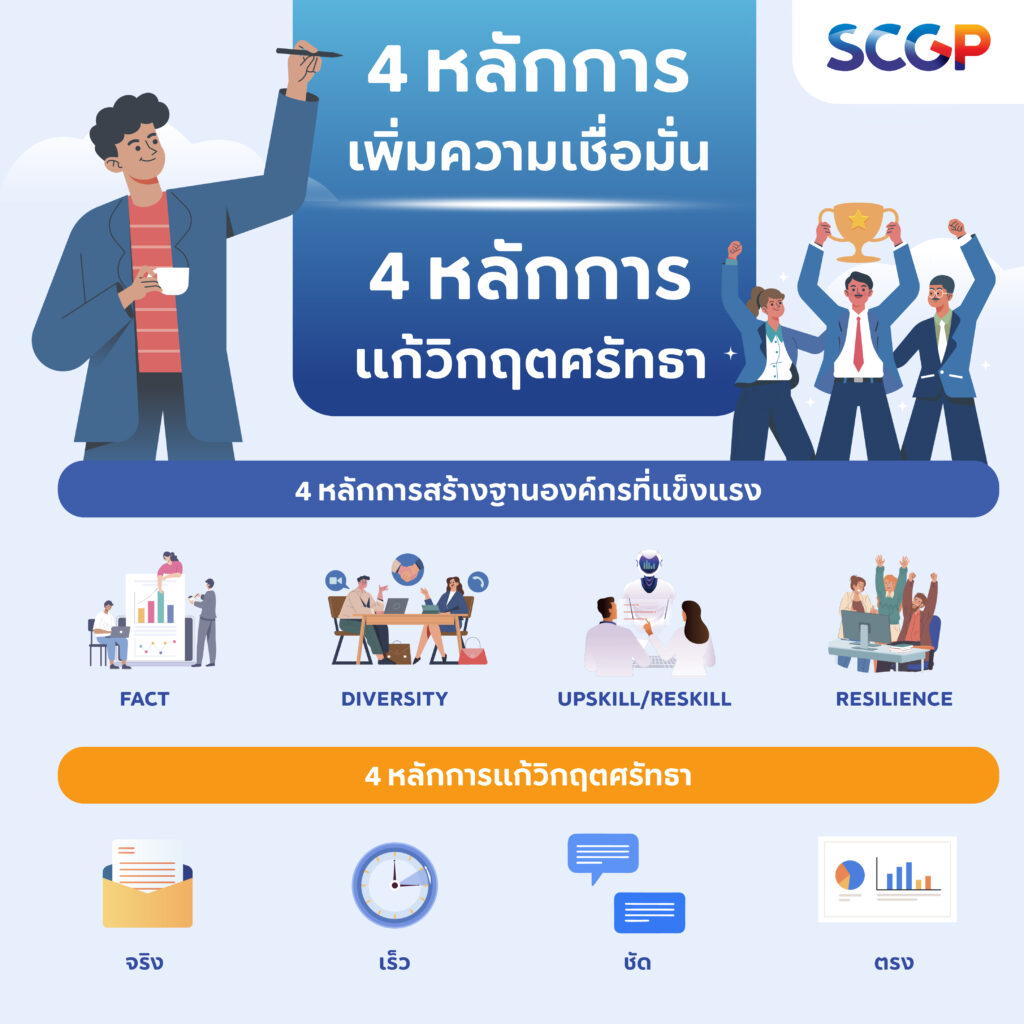Spotlight
4 Trust Building Rules & 4 Crisis Management Rules

In the face of volatile economy, maintaining trust requires careful management. Once trust is lost, regaining it can take a long time and directly affect business operations. Your Answers has recently sat down with Asst. Prof. Dr. Ake Pattaratanakun to explore guidelines on how organizations can sustain trust. He recommends 4 rules to help businesses stand firm amid uncertainty.
4 Rules for Organizations’ Firm Foundation
When an organization loses trust, the consequences can be detrimental in every aspect. Assoc. Prof. Dr. Ake thus emphasizes that it is necessary to build a solid foundation from within. This can be achieved through 4 principles: Fact, Diversify, Upskill/Reskill, and Resilience.
Fact holds key to organizations’ efforts to manage situations effectively. Organizations, after all, need accurate, precise, and comprehensive data, especially during times of panic or uncertainty. Incomplete or incorrect information can lead to poor decisions, worsening the situation. Organizations thus should invest in data collection and analytics, paying attention to not just national and global news but also social trends. With modern technology making fact-checking more challenging, using Social Listening Tools can help executives better understand situations. If a brand faces negative publicity, these tools can assess whether it is a minor issue that can be overlooked or a major crisis requiring immediate action. Accurate facts are the important basis of sound decision-making.
Diversify is a key principle for risk reduction. Enterprises that rely on a single revenue stream are highly vulnerable to industry disruptions. For example, auto mechanics specializing only in internal combustion engines may lose their importance as the market shifts toward electric vehicles (EVs). Businesses, therefore, must plan ahead and develop contingency strategies. Those that diversify and expand into new businesses will enjoy greater security and get better equipped to deal with unexpected changes.
Upskill/Reskill is at the heart of organizations’ capability building. Their members at all levels, from employees to executives, must continuously learn and develop new skills. As the business landscape evolves rapidly, organizations that fail to adapt will be left behind. For instance, executives unfamiliar with fundraising may need to study and acquire an understanding of global financial markets, while employees unaccustomed to AI must learn to leverage the new technology efficiently. Professional standards in various industries are constantly changing too. Accountants, for example, must stay updated on new practices and new forms of assets in the wake of technological disruptions. Only organizations that adapt well and constantly upskill/reskill will maintain a competitive edge.
Resilience, the ability to recover and adapt quickly, is another key factor. No organization is immune to problems and setbacks, so the ability to fail fast and bounce back is critical. In the future, speed and flexibility—also known as agility—will play a crucial role in organizational management. Traditional corporate cultures that punish mistakes can create environments that stifle learning and innovation. Encouraging employees to experiment with new ideas and recover quickly from any failure, on the other hand, will strengthen the organization.
Same Mindset for The Whole Organization
The aforementioned 4 rules must be more than just concepts—they need to be implemented at every level of the organization for systematic, adaptive, and effective management. Organizations must communicate these principles clearly so that all employees adopt the same mindset. Resilience will happen only when members realize that mistakes are learning opportunities rather than career setbacks. Shaping employees’ mindset can be achieved in various ways, such as rewarding those who overcome failures and develop effective solutions or hiring young professionals whose perspectives align with the organization’s direction.
“True, Fast, Clear, Relevant”: 4 Crisis Management Rules
When an enterprise falls into a crisis, the most important things are to maintain credibility and efficiently solve the problem. The “True, Fast, Clear, Relevant” rules will enable enterprises to respond professionally to negative rumors and situations.
“True” here means enterprises must release facts about the situation. If they are responsible for mistakes, they must admit it sincerely and show responsibility. “Fast” means enterprises must quickly respond to the situation. As rumors and public sentiments can rage on like wildfires, a slow response, therefore, may mean the situation may finally become uncontrollable. “Clear” requires that enterprises communicate in a straightforward and concise manner. “Relevant” is about catering the messages properly to target groups. For example, investors will want reassurances, transparency, and proper response plans. Customers, meanwhile, will expect enterprises to show the ability to continue delivering value and good services.
Summary: Trust needs to be built and managed.
4 trust-building rules—Fact, Diversify, Upskill/Reskill, and Resilience form a strong foundation for business stability, while the “True, Fast, Clear, Relevant” approach enables organizations to navigate crises and restore credibility fast. By implementing these strategies, businesses can adapt to change and grow solidly in an unpredictable world.
Reference: Your answers from a LOT Vol.35
